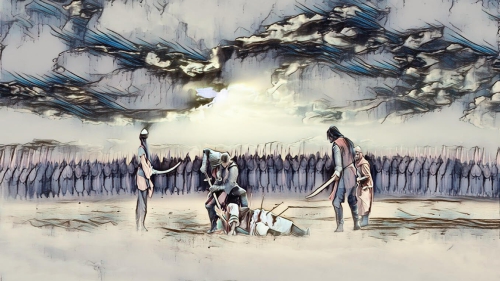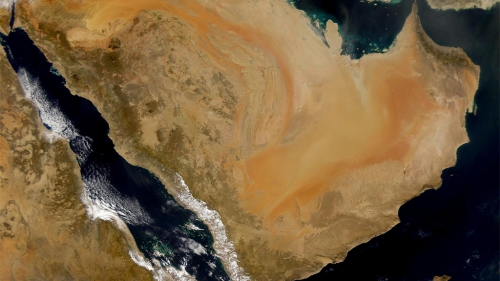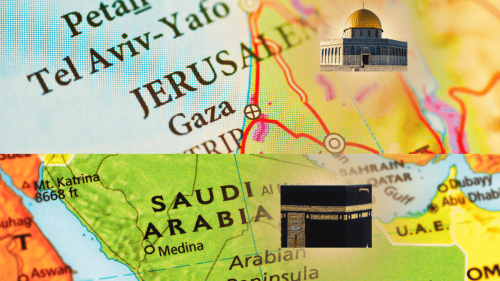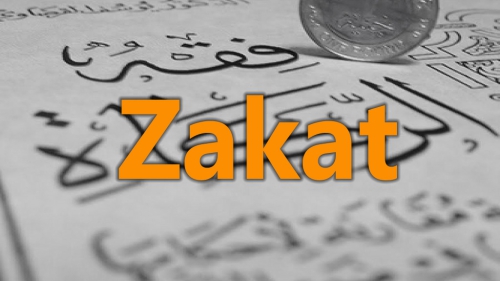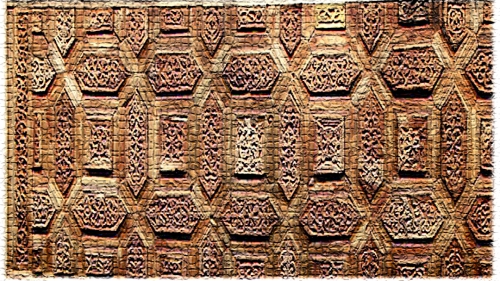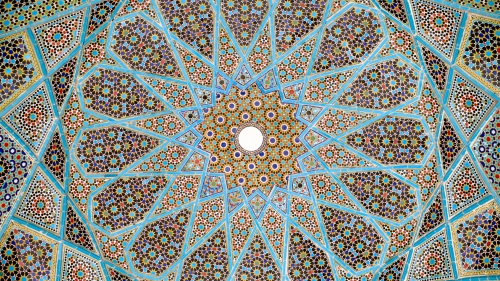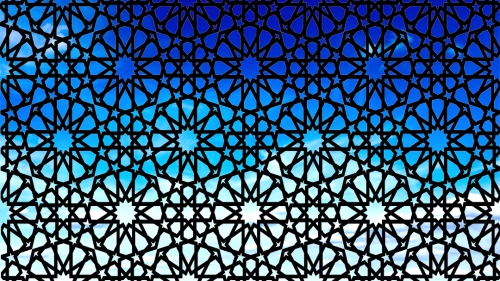Badr Was a Miraculous Gift, Uhud a Reality Check

The battles of Badr and Uhud were fought in the 2nd and 3rd years respectively following the hijrah or migration from Makkah to Madinah. That corresponds to 624 and 625 CE. They were the first and second major battles in the history of Islam. If scrutinized carefully, the two battles complemented each other. They constituted a comprehensive whole whereby the processes of refining and developing the nascent Muslim community were moved to another level.
Such a phase was necessitated by the fact that the first Muslims had just migrated from the unfavorable milieu of Makkah to the one of Madinah that held a lot of hope and optimism as much for the migrants as for the new converts of Madinah (the Ansar or helpers). With a new geographical and cultural milieu and a new demographical character on board, the Islamic mission stood at the threshold of an exciting, and to some extent even uncertain, future. The next chapter was the intensification of the human development programs along the lines of the new-fangled ones aimed at the development of society en bloc and its civilizational trajectory. After all, the hijrah had been undertaken because the latter proved unfeasible in Makkah.
That is why no sooner had the Prophet migrated to and settled in Madinah than he changed the name of the new setting from Yathrib to Madinah, the latter meaning “the city.” The word “madinah” is derived, among other things, from the expressions “maddana” and “tamaddun” which signify “to civilize” and “civilization” respectively. Hence, the meanings contained in the word “madinah” were “urbanity”, “class” and ‘civilization.”
The hijrah was a trial, yet the climax of all trials associated with the Makkan period, which not only the migrants but also the Madinah natives, passed with flying colors. Other undoubtedly bigger trials lay ahead as the new community was growing accustomed to its novel identity and corresponding roles. The stage was set for an exhilarating future and the historic battle of Badr could not come soon enough.
As far as the personal and collective affairs of the Muslims were concerned, Badr was used as a transitional chapter from one existential phase to another and from one developmental paradigm to another. However, so demanding was the chapter that the Uhud episode was also needed to complement and perfect it.
Islam as a total living code and the Muslims as the future world leaders and civilizational trailblazers needed both the feel-good factor of Badr and the painful, together with awakening, sides of Uhud for self-actualization. Without a doubt, every greatness must feature the spirit of each of the two, subtly balancing them. It follows that if Badr was a miraculous gift, so was Uhud in its own right; and if Uhud was a test, so was Badr in its own unique way for the insightful ones.
The Lessons of Badr Versus the Lessons of Uhud
Badr - in which a small and poorly armed group of Muslims, against all odds, routed a numerically and militarily superior enemy - was a gift to the faithful: both the migrants of Makkah and the Ansar of Madinah. It was furthermore a reward for the former’s determination and fortitude, and the latter’s generosity, goodwill, and overall humanity.
Badr was a heavenly bequest. It was the outcome of Almighty God’s direct intervention and guidance. Just as He was directly inspiring and teaching His final messenger to mankind, Prophet Muhammad (peace and blessings be upon him and his family), other things, now God intervened and guided him directly as well. Apart from being a miraculous reward, Badr was also a revelation. It was part of a direction for the future.
In order to perfect the pattern, and even to counterbalance the impact of Badr, an Uhud was required. A condition was looked for to fully operationalize and optimize - and somewhat fine-tune - the lessons of Badr. So auspicious was Badr that a level of complacency with some people, as a sprouting snag, was not ruled out. What was needed was a kind of experiential and hands-on learning by which people could independently immerse themselves in matters, partake in events on their own and so, could experience them differently and in such a manner learn therefrom and move forward.
In other words, what was needed was to put people in charge, so to speak, using Badr and the rest of the teachings and values of Islam as a blueprint. It would not be an exaggeration to say that, essentially, it was considered necessary that people started to take control of their own destinies. If the Badr experience was heavenly first and foremost, the one affiliated with Uhud was earthly above all. Moreover, if the former was divinely inspired and as such was served to people, the latter was humanly, as well as terrestrially, executed and as such was juxtaposed with – and appealed to - the standards of heaven.
That is to say, at Badr, Almighty God and His angels were exclusively in command, while at Uhud it was people. At Badr, the standards were set, while at Uhud they were not met. And finally, while the success of Badr was attributable directly to God – and His angels – and indirectly to the battle’s participants, the failure of Uhud was attributable solely to people. They failed to rise to the challenge and meet the standards of Badr, hence failing to “activate” the intervention of a higher heavenly mandate.
One of the greatest lessons of Uhud, it stands to reason, was the realization of why at that particular point the man-God and earth-heaven axes did not work and what was necessary to make them work. Also, the flawless God-man and heaven-earth axes were appreciated more as a result. People became more grateful, more down-to-earth, and more considerate. They became more prepared. This establishes that the boons and lessons of Uhud were on par with those of Badr.
All this was in conformity with a dictum enshrined in the bosom of the Qur’anic texts: “What comes to you (O man) of good is from Allah, but what comes to you of evil, is from yourself” (Quran 4:79). Also: “And whatever strikes you of disaster - it is for what your hands have earned” (Quran 42:30).
Thus, the Uhud episode – in which the Muslims, after initial advances, were virtually defeated due to the greed, military indiscipline, and overconfidence of some Muslim soldiers - filled all the necessary gaps. People were taught that neither victories nor defeats are permanent. Both of them in principle are relative. They are subject to how people conceive and handle them. While to some a victory may be useful, to others however it may not, and vice versa.
Both victories and defeats ought to be put into perspective. They are to be seen against the backdrop of a bigger ontological picture. Winning or losing battles is rather irrelevant so long as wars are won in the end. No matter what, come victory or defeat, people cannot lose their way and compromise either their faith or self-worth. Positively, Islam offers its adherents whatever it takes for emerging victorious under all material and immaterial circumstances. Badr and Uhud were platforms for driving home the message.
The Qur’an on the Two Battles
The Qur’an documents the fundamental aspects of the two battles. The battle of Badr is featured in the surah or chapter of al-Anfal (the Bounties or Spoils of War). The whole chapter, revealed in the aftermath of the battle, is dedicated to the purpose. The battle of Uhud, on the other hand, is dealt with in the chapter of Ale-Imran (the Family of Imran), from verse 121 to the last verse, no. 200.
Both accounts are extensive. They are not presented in chronological order. Rather, they are in the forms of explicit, as well as implied, lessons, morals, counsels, principles, and rules. While some of those are specific, others are general; and while some are transitory, others are absolute and constant. Together they constitute a compact and inexhaustible body of transcendent wisdom and guidance.
The al-Anfal account about Badr, by and large, features declaratory, exclamatory, imperative, and conditional sentences. The subjects or the performers of the actions are Almighty God and His angels, whereas people are the target. As if God reveals that Badr was His divine plan, after which He goes about disclosing how His divine will worked and His plan unfolded. People were but means and instruments of the implementation. The benchmark of excellence and the ideals of human struggle were established forever thereby. The frame of reference has become unmistakable.
Conversely, the Ale-Imran account concerning the battle of Uhud, even though containing similar linguistic approaches and style, is more uniform, and even streamlined, according to which people, most of the time, are at once the subjects and objects. The account is more actual and more tangible. The participants of the Uhud battle, all the potential followers of the unfortunate pattern generated during the occasion, and the entire Muslim community in any time and context, are the target of the Alu ‘Imran discourse.
Overarched by the powerful Badr model, the Uhud incident was human-centered and so were the consequences together with responsibilities. Numerous human flaws and shortcomings were exposed in the process, as a result of which the Ale-Imran account duly saw to the outcomes. Those flaws were exposed exclusively for the sake of remedying them.
It goes without saying that Badr was an archetype, Uhud a poor imitation. The relationship between heaven and its standards and the vagaries of the earthly struggles, specifically with regard to the new challenges of warfare the first Muslims were compelled to face, had to be additionally polished and further upgraded. All the subsequent armed conflicts - such as the battle of Khandaq or the Trench in 627 CE, the battle of Mu’tah in 629 CE, the conquest of Makkah in late 629 CE or early 630 CE, the battle of Hunayn in 630 CE, and the expedition of Tabuk in 630 - were occasions wherewith it became clear that the matter denoted a steep learning curve.
Although the process was replete with recurring ups and downs, the Muslims demonstrated that they were keen and fast learners. At any rate, no instance in history was bereft of either Badr or Uhud components. There were yet times when both of them, amalgamated, were featured prominently. The spirits of Badr and Uhud lived on ever since, becoming, as well as shaping, the destinies of Muslim societies.
Comparing the Badr and Uhud accounts in the Qur’an
When the nuances of the Badr and Uhud accounts in the al-Anfal and Ale-Imran Qur’anic chapters are compared, the above-mentioned truths start coming to the fore. What follows is a brief assessment of a number of foremost issues.
First, in the context of the Badr battle in the chapter of al-Anfal (Quran 8:5), the Qur’an reveals that it was God who with the truth had brought the Prophet out of his home for the battle. But in the context of the Uhud battle in the chapter of (Quran 3:121), the Qur’an states that the Prophet, all by himself, had left his family early in the morning for the battle. Moreover, to further humanize the Uhud affair and etherealize-cum-spiritualize the one associated with Badr, the Qur’an highlights that on the eve of the former, the Prophet went forth from his family, but on the eve of the latter, he was caused by God to set forth from his home, rather than his family, which in itself is an abstract, yet spiritual, element.
Second, the Qur’an underlines that at Badr the Muslims did not kill the Makkan idolaters, but it was Almighty God who killed them; nor did the Prophet throw when he threw a handful of sand or dust towards the Makkan positions due to which the idolaters’ vision was rendered blurry, but it was God who threw. This was a favorable test, or a good gift, from God to the believers (Quran 8:17). However, at Uhud, it was the Muslim combatants who, as per the Qur’anic message, were killing the enemy with God’s permission. This was at the beginning of the Uhud battle when the Muslims had the upper hand. The Qur’an describes the condition in terms of God making good His promise (Quran 3:152).
Third, at Badr, the Prophet was supported directly by God, His angels, and the believers (Quran 8:9,62). Whereas at Uhud, there were no angels. The Prophet was left with the believers only, some of whom, unfortunately, lost courage, fell to disputing, fled, and climbed the Uhud Mountain without looking aside at anyone while the fearless Prophet was calling them from behind (Quran 3:152, 3:153).
Fourth, at Badr, it was God who had brought them together and had put affection between the hearts of the believers. “If you (O Muhammad) had spent all that is in the earth, you
could not have brought their hearts together; but Allah brought them together. Indeed, He is Exalted in Might and Wise” (Quran 8:63). In relation to the Uhud episode, on the other hand, it was the Prophet who had been credited with forging cordial relations with and between the believers. Were it not for the Prophet’s infinite kindness and wisdom, the notions of Muslim brotherhood and mutual love would have been hard to come by. The Prophet furthermore was explicitly asked to continue doing so for the sake of ensuring a bright future: “So by mercy from Allah, (O Muhammad), you were lenient with them. And if you had been rude (in speech) and harsh in heart, they would have disbanded from about you. So pardon them and ask forgiveness for them and consult them in the matter. And when you have decided, then rely upon Allah. Indeed, Allah loves those who rely (upon Him)” (Quran 3:159).
Fifth, at Badr, Satan was active in his designs until the commencement of the battle, after which (when the two armies came in sight of one another) he was rendered powerless. What is more, having come to terms with the actual state of affairs, and being able to foresee the outcome of the battle, Satan took flight, dissociating himself from the idolaters and their case and openly affirming his fear of God who is “severe in penalty” (Quran 8:48). Satan fled the battlefield of Badr to save his own skin, leaving his allies of Makkan idolaters in the lurch to whom just a while ago while on the way to the Badr scene, he was boasting that he was their protector. As sly as he was, Satan knew he was no match for what God had in store for the looming Badr affair. Needless to say, at the same time, the matters of the believers were off limits to Satan. His evil suggestions were removed from them (Quran 8:11, 8:48). However, in connection with the Uhud battle and the failure of many Muslims, the Qur’an is unequivocal that it was Satan who had caused the people to slip because of some blame or bad deeds they had earned. Just as the Muslims were left to face the Makkan enemy alone, they likewise were left to face Satan alone. The physical failures during the Uhud battle were closely related to, yet were caused by spiritual failures. It follows that neither Makkans nor Satan defeated the Muslims; they defeated themselves. Their spiritual faults opened the door and paved the way for calamity. The Muslim behavioral model contravened every sense and formula of success whose foundation has been laid during the battle of Badr and has been encoded forever in the resultant al-Anfal chapter (Quran 8:53): “That is because Allah would not change a favour which He had bestowed upon a people until they change what is within themselves.”
Sixth, as a primary lesson of Badr, the Qur’an draws attention to the importance of faith, obedience, patience, unity, and steadfastness, as a proven path to all sorts of victories: “And obey Allah and His Messenger, and do not dispute and (thus) lose courage and (then) your strength would depart; and be patient. Indeed, Allah is with the patient” (Quran 8:46). However, at Uhud, this sacred code was violated and the Qur’an held responsible the guilty Muslim parties, censuring them for losing courage, quarreling, disputing, disobeying, and favoring the fleeting benefits of this world (Quran 3:152).
Seventh, at Badr, God overwhelmed all Muslim soldiers with drowsiness giving security from Him (Quran 8:11). But at Uhud, such was the case only with the loyal and unwavering faction of Muslims. Another faction guilty of the failure was not rewarded with the security of calming drowsiness, because those people worried about themselves only, thinking of God other than the truth - the thought of ignorance (Quran 3:154).
Eighth, the Badr discourse of the al-Anfal chapter features the true believers and their exemplary characteristics only, whereas the one concerning Uhud in the Alu ‘Imran chapter is tripartite, including the true believers, the weak believers who eventually failed the Uhud test, and the hypocrites.
Ninth, the divine help and blessings of Badr were guaranteed (Quran 8:9, 8:10); afterwards, the same had to be earned. The Prophet knew the rule, thus, lest some people should become complacent and even ostentatious, he reminded them that, before anything else, they had to be forbearing, grateful, and conscious of God (Quran 3:123, 3:125).
Tenth, the Qur’an highlights that the immediate objective of the Badr battle was for God to establish the truth by His words and to eliminate the disbelievers, as well as to establish the truth and abolish falsehood even if the criminals disliked it (Quran 8:7, 8:8). However, the objectives of the Uhud battle were slightly different. They still revolved around exposing the evil and separating it from the good, albeit with an immediate focus on the purification of the faith and conduct of the people so that they could become worthy protagonists in such a noble procedure. This implies that even though the short-term goals of Badr and Uhud were somewhat dissimilar, the long-term ones were the same (Quran 3:179).
Eleventh, while the al-Anfal chapter talks about the death of the enemy as a prominent aspect of their humiliating defeat at Badr, the Ale-Imran chapter speaks about the death of the believers as an equally prominent facet of their Uhud disaster.
Twelfth, while the Prophet was corrected and even slightly criticized in the chapter of al-Anfal by God for taking prisoners of war and for ransoming them during the battle of Badr (Quran 8:67), it was a party of people during the battle of Uhud who criticized and even accused him of acting dishonestly as regards war booty. They alleged that he was false to his trust, as a result of which God and His revelation had to intervene and absolve the Prophet of any even slightest wrongdoing: “It is not (attributable) to any prophet that he would act unfaithfully (in regard to war booty). And whoever betrays, (taking unlawfully), will come with what he took on the Day of Resurrection. Then will every soul be (fully) compensated for what it earned, and they will not be wronged” (Quran 3:161).
Thirteenth, in the context of Badr, the Qur’an calls attention to the importance of the unity and cooperation paradigm, which is rather intrinsic to human beings, with which nonbelievers nonetheless seek to spread tumult and mischief on earth and the believers’ righteousness and goodwill: “And those who disbelieved are allies of one another. If you do not do so, there will be fitnah on earth and great corruption” (Quran 8:73). This is a general rule nested among an array of the al-Anfal chapter’s axioms and guiding principles. The rule contains myriads of practical implications one of which is duly presented within the framework of the Uhud battle narrative: “O you who have believed, if you obey those who disbelieve, they will turn you back on your heels, and you will (then) become losers. But Allah is your protector, and He is the best of helpers” (Quran 3:149, 3:150). The message entailed therein is that the best fraternity is that of the believers, whose best protector is nobody else but God, and that the best guidance is the revealed guidance of God. There are no other viable alternatives. No believers should be deceived by the existential law of God – whose two major sides became apparent during the Badr and Uhud experiences - based on which periods or vicissitudes of varying fortunes are caused to follow one another for mankind, and thus slacken and start breaching the stipulations of the truth. In their respective ways, the occasions of Badr and Uhud demonstrated the working patterns both of truth and falsehood and their followers. It became crystal clear who is who and what is what in the grand scheme of things.
Fourteenth, while the al-Anfal chapter is awash with references to the ways wealth is to be conceived, acquired, and spent Quran 8:1, 8:28, 8:36, 8:41, 8:69) – which is not surprising given that at the core of the causes of the battle of Badr, of the battle itself and its aftereffects, resided the prospect of the wealth and goods of the Makkan caravan that was returning from the Levant, the novel phenomenon of the spoils of war, and the equally novel idea of ransoming the war captives – the Ale-Imran chapter refers to the prohibition of usury as the mother of all commercial vices, such as greed, selfishness, corruption, exploitation, dishonesty, and fraud. It was some of those vices that prompted the appalling acts at Uhud, leading to the catastrophe. The probability of the spoils of war and the trophies of victory impaired some people’s thinking. Having been unable to control themselves, the conduct became impacted too. Thus, in tandem with dwelling on the Uhud report, the Qur’an wanted to strike at the heart of the problem, knowing that once the root cause is eliminated its effects soon will follow. Consuming usury was strictly prohibited for it was compatible neither with the Islamic faith nor the honorable status of the faithful. The antidote served was a blend of spiritual devotion, God-consciousness, and obedience to God and His Prophet. Future Uhuds were to be prevented at all costs.
Fifteenth, relating to Badr, the Qur’an reminds us that responding to and obeying God and his Prophet means the safeguarding of spiritual life (Quran 8:24) – which is the only true and consequential form of existence - whereas relating to Uhud, the Qur’an suggests that the complete wellbeing of the believers, physical and spiritual, depends on their relationship with God and the Prophet. Accordingly, the people suffered during the Uhud episode only owing to their wavering faith and their disobedience of the orders of the Prophet (Quran 3:154, 3:157, 3:164-7)
Sixteenth, in the al-Anfal chapter (Quran 8:47, 8:62, 8:73), the plots of nonbelievers are generally reduced to the chances of averting people from the way of God, trying to deceive the Prophet and his adherents, and of spreading oppression and mischief. These are countered by highlighting the verity that God is the guardian of His religion, His Prophet, and His ardent servants. “He is All-Sufficient for all of them” (Quran 8:62), hence never will He afford nonbelievers a way to utterly triumph over the believers. However, due to the nature of the Uhud account in the Ale-Imran chapter, the conspiracies of nonbelievers therein are elevated to the level of killing prophets. Many of those attempts, historically, were successful, a fact underscored by the chapter. At Uhud, the Prophet, too, as the seal of God’s messengers, was targeted. At long last, he was wounded on his forehead and lip and one of his front teeth was broken. The word spread across the battlefield to the effect that the Prophet also had been killed. The Qur’an used this opportunity to enhance the people’s worldview concerning life, death, prophethood, and divine providence (Quran 3:144, 3:145, 3:183).
Seventeenth, prior to the Badr battle, there was a party among the believers who were unwilling and averse to the fight. They were “arguing with you (O Muhammad) concerning the truth after it had become clear, as if they were being driven toward death while they were looking on” (Quran 8:5, 8:6). However, there were no negative and lasting consequences thus accrued because the people quickly mended their ways and because, simply, a higher order of things presided over the proceedings. A similar scenario came to pass during the battle of Uhud as well (Quran 3:122), which was later exacerbated by the misconduct of a party of Muslim soldiers. As one would expect, the consequences at Uhud, unlike the case of Badr, proved dire. The people were left to themselves and they failed to rise to the occasion, hence sending direct and miraculous divine help, or angels remained a dormant prospect. There were neither shortcuts nor alternate routes to the approval of heaven.
If the people only followed the example, together with the commands, of the Prophet, the Uhud experience would have been another miracle; it would have been another Badr. The onset of the battle hints that the occurrence was one of the greatest might-have-been in Muslim history. The Prophet’s military genius was unprecedented - acknowledged by the revelation as “assigning to the believers their positions for the battle” (Quran 3:121) - and his valor unmatched - also acknowledged by the revelation as “while the Messenger was calling you (the fleeing soldiers) from behind (to fight)” (Quran 3:153). The Prophet, in addition, wore two coats of mail, indicating metaphorically at least that he was doubling his determination and readiness for the task ahead. If then any form of miraculous heavenly help was dispatched, it would have been all well and good, but if it was not – as it was the case – the Prophet was able to claim that he had done everything he could, a feat that was expected from everybody else. And doing just that - in particular against the background of the capacities of the truth and the potency of a great many promises of Almighty God for the believers - was sufficient either for activating miracles in heaven or for generating them down on earth.
Topics: Companions (Sahabah), History, Ramadan Values: Trust In Allah (Tawakkul) Channel: Ramadan - Day 17
Views: 2711
Related Suggestions





